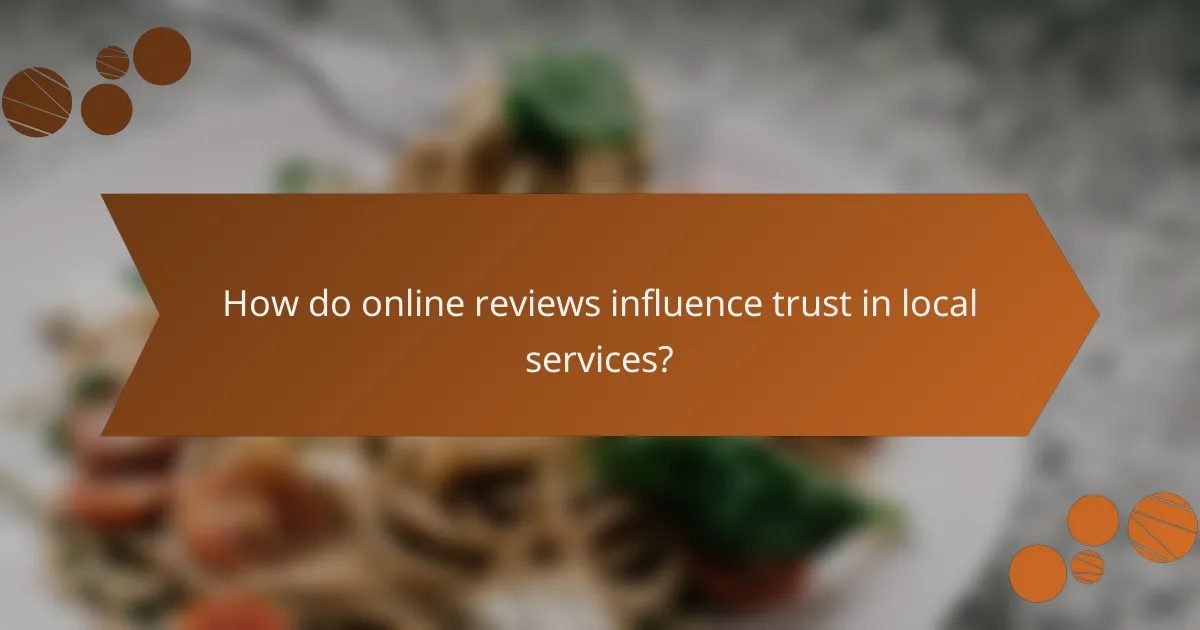Online reviews play a crucial role in establishing trust with local services, as they directly influence potential customers’ perceptions. Positive feedback can enhance a service’s reputation, while negative comments often lead to skepticism, making it essential for businesses to actively manage their online presence.

How do online reviews influence trust in local services?
Online reviews significantly impact trust in local services by shaping potential customers’ perceptions. Positive feedback can enhance a service’s reputation, while negative comments may lead to skepticism and hesitation in choosing that service.
Positive reviews enhance credibility
Positive reviews serve as endorsements, boosting the credibility of local services. When potential customers see favorable ratings and testimonials, they are more likely to trust the service provider and feel confident in their decision to engage with them.
For example, a local restaurant with numerous five-star reviews on platforms like Yelp or Google can attract more diners than a similar establishment with few or no reviews. This social proof is crucial in a competitive market.
Negative reviews can deter potential customers
Negative reviews can have a substantial impact on a service’s ability to attract new customers. A single poor review can overshadow multiple positive ones, leading potential clients to reconsider their choices.
For instance, if a plumbing service has several complaints about poor workmanship, even a few positive reviews may not be enough to convince a homeowner to hire them. It’s essential for businesses to monitor and respond to negative feedback to mitigate its effects.

What types of online reviews are most impactful for local services?
Online reviews significantly influence consumer trust in local services, with certain platforms proving more effective than others. Reviews on Google My Business, Yelp, and Facebook are particularly impactful due to their visibility and user engagement.
Google My Business reviews
Google My Business reviews are crucial for local services as they appear prominently in search results and Google Maps. A high rating, typically above 4 stars, can attract more customers, while a low rating may deter potential clients.
To maximize the impact of these reviews, encourage satisfied customers to leave feedback. Responding to reviews, both positive and negative, demonstrates engagement and can enhance your business’s reputation.
Yelp reviews
Yelp reviews hold significant weight, especially in service-oriented industries like restaurants and home services. Many users rely on Yelp to gauge the quality of local businesses, making a strong presence on this platform essential.
Maintaining an active Yelp profile involves regularly updating business information and responding to customer reviews. Aim for a consistent star rating of 4 stars or higher to build trust with potential customers.
Facebook recommendations
Facebook recommendations are valuable as they leverage social proof, allowing users to see feedback from their friends and family. This personal endorsement can significantly influence a consumer’s decision-making process.
To enhance your Facebook presence, encourage customers to leave recommendations and engage with your audience through timely responses. A strong recommendation score can enhance your visibility and credibility in the local market.

How can local services encourage more online reviews?
Local services can encourage more online reviews by actively engaging with customers after their experience and making the review process easy and rewarding. Simple strategies like requesting feedback and offering incentives can significantly boost the number of reviews received.
Requesting reviews post-service
One effective way to garner online reviews is to request them immediately after the service has been provided. This can be done through follow-up emails, text messages, or even in-person conversations. Timing is crucial; reaching out within a few days ensures that the experience is fresh in the customer’s mind.
When asking for reviews, be specific about where customers can leave their feedback, such as Google, Yelp, or Facebook. Providing direct links can simplify the process and increase the likelihood of receiving a response.
Incentivizing feedback through discounts
Offering discounts or small rewards can motivate customers to leave reviews. For example, a local restaurant might provide a 10% discount on the next meal for customers who write a review. This not only encourages feedback but also fosters repeat business.
However, it’s essential to ensure that any incentives comply with local regulations regarding reviews. Transparency is key; customers should know that their feedback is valued, but the incentive should not influence the honesty of their review.

What role does response to reviews play in building trust?
Response to reviews is crucial in establishing trust with local services as it reflects a business’s commitment to customer satisfaction and engagement. By actively responding to both positive and negative feedback, businesses can foster a sense of reliability and transparency among potential customers.
Timely responses show engagement
Timely responses to reviews indicate that a business values its customers and their opinions. When a company replies within a few hours or days, it demonstrates attentiveness and a willingness to engage with its clientele. This can significantly enhance the perception of the business in the eyes of potential customers.
For example, if a local restaurant promptly thanks a customer for a positive review or addresses a concern raised in a negative review, it can create a positive impression. Aim to respond to reviews within 24 to 48 hours to maximize impact.
Addressing negative feedback demonstrates accountability
Addressing negative feedback is essential for demonstrating accountability and a commitment to improvement. When businesses acknowledge complaints and offer solutions, it shows they take customer concerns seriously and are willing to make changes. This can turn a dissatisfied customer into a loyal one.
For instance, if a service provider receives criticism about delays, responding with an apology and outlining steps taken to prevent future issues can rebuild trust. Always approach negative feedback with empathy and a constructive attitude to foster a positive relationship with customers.

How can local services manage their online reputation?
Local services can effectively manage their online reputation by actively monitoring reviews and utilizing tools designed for reputation management. This proactive approach helps build trust with potential customers and enhances overall service credibility.
Monitoring review platforms regularly
Regularly monitoring review platforms is crucial for local services to stay informed about customer feedback. This involves checking popular sites like Google My Business, Yelp, and Facebook at least weekly to capture new reviews and respond promptly.
By addressing both positive and negative reviews, businesses can demonstrate their commitment to customer satisfaction. For instance, thanking customers for positive feedback and offering solutions for negative experiences can significantly improve public perception.
Utilizing reputation management tools
Reputation management tools can streamline the process of monitoring and responding to online reviews. These tools often aggregate reviews from multiple platforms, allowing businesses to view their reputation in one place and respond efficiently.
Some popular tools include BirdEye, ReviewTrackers, and Trustpilot, which offer features like automated alerts for new reviews and analytics to track review trends. Investing in these tools can save time and help local services maintain a positive online presence.

What are the legal considerations for soliciting reviews?
When soliciting reviews, businesses must navigate various legal considerations to ensure compliance and maintain trust. Key factors include adhering to guidelines set by regulatory bodies and ensuring the authenticity of the reviews collected.
Understanding FTC guidelines
The Federal Trade Commission (FTC) provides clear guidelines regarding online reviews. Businesses must disclose any material connections with reviewers, such as compensation or free products, to avoid misleading consumers. Failure to comply with these guidelines can lead to penalties and damage to reputation.
To stay compliant, companies should implement a policy that encourages honest feedback while clearly stating any incentives offered for reviews. This transparency helps build trust with potential customers and aligns with FTC expectations.
Ensuring authenticity in reviews
Authenticity is crucial for the credibility of online reviews. Businesses should avoid practices like posting fake reviews or incentivizing only positive feedback, as these can lead to legal repercussions and loss of consumer trust. Instead, focus on encouraging genuine customer experiences.
One effective approach is to request reviews from a diverse range of customers after they have used the service. This can be done through follow-up emails or feedback forms, ensuring that the reviews reflect a balanced perspective. Additionally, using third-party platforms for reviews can enhance credibility.
